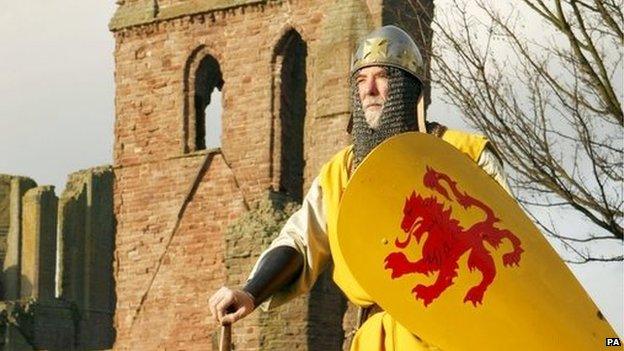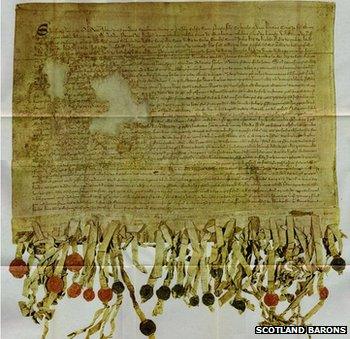A historic setting for a modern offer
- Published

A sense of history. Over the weekend, I took the chance to see the magnificent James Plays at the Edinburgh Festival. The performances thoroughly merited the standing ovation offered by the enthused audience.
(If you will forgive me, I will excise from my memory, both recent and historic, another contest which took place in the east end of Glasgow over the weekend. I prefer to dwell on events at Pittodrie and Tannadice. Much more germane.)
From the outstanding narratives of Jamies One to Three, my historical focus switched to Arbroath today where the First Minister was renewing his acquaintance with the 1320 Declaration of popular sovereignty and independence from England. In modern context, Mr Salmond favours both.
In Scotland's wider story and the Nationalists' narrative, there is no icon more enduring than Arbroath Abbey. But, if the setting was historic, the accompanying political offer was modern.
'Declaration of Opportunity'
Mr Salmond said his proposal amounted to a Declaration of Opportunity - to preserve the NHS from privatisation, to build a fairer society and to enable young people to stay in Scotland and to work here. In a speech tonight, he argues that the greatest argument for independence is the relatively low population growth in Scotland in the last century: much of it under devolution.

The Declaration of Arbroath was signed in 1320
But his political opponents suggested today that he had an opportunity of another kind: to clarify the situation regarding the currency which might be used in an independent Scotland.
Mr Salmond argues that clarity might usefully come from those very opponents: that they could say that they would be prepared to countenance a sterling union in the interests of both Scotland and the remainder of the UK.
That, of course, they will not do. They say it would not ultimately be in the interests of either Edinburgh or London. Right now, it would not be in the interests of the pro Union side to ameliorate things for the "Yes" camp.
Pressed on the wireless this morning, Mr Salmond again floated other options which, he said, had been identified by the Fiscal Commission. He cited the selfsame commission as mentioning the prospect of a unilateral use of sterling - as a transitional arrangement.
His opponents pursued that point. Transition to what? To a separate currency? Over what period? In response, Mr Salmond repeated his point: that the Fiscal Commission, established by his government but operating autonomously, had identified a range of options before proposing sterling union as the most advantageous on all sides, in the event of independence.
Salmond's conundrum
Mr Salmond also used his setting. The Arbroath Declaration, he said, had invented the concept of popular sovereignty. Similarly, today, if people chose independence, they were voting for the White Paper - including the plan for a sterling zone. They would be entitled to have that package delivered.
No, say his opponents. Independence would make the remainder of the UK a foreign country - pursuing its own interests. In response to that, Mr Salmond say those interests would best be served by a sterling zone.
Once more, Mr Salmond's conundrum confronts him. He needs endorsement for his sterling zone from the very politicians whose immediate interests are served by setting out to thwart the salience of that offer.
Supporters of independence insist that people can see through the Unionist "bluff", that polls suggest there is momentum their way. Supporters of the Union say people will turn out for them. The people will declare their verdict in one month's time.